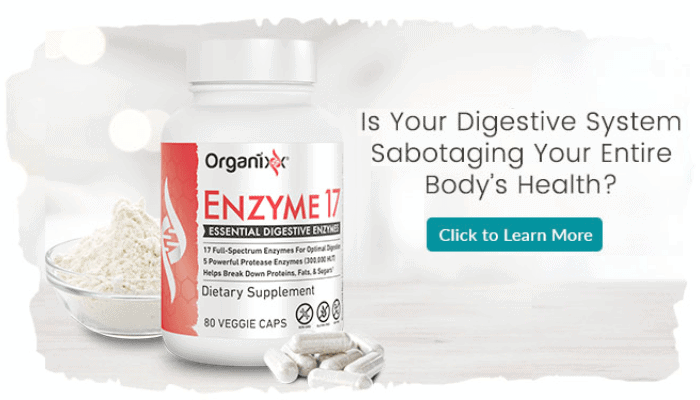Video Transcript:
Today’s question comes from one of our viewers asking about collagen for leaky gut. Specifically, this individual says, “A lot of people are taking collagen, but we’re not sure what is the right amount. Can you clarify, for individuals who want to heal leaky gut, how much collagen should we be taking?”
Collagen Supports Digestive Healing
This is a fantastic question because our Clean Sourced Collagens is highly effective at helping you heal the open, leaky junctures – the tight junctures that get opened from digestive imbalances in leaky gut. Collagen can help support that closure of the gut juncture.[1]
How to Microdose with Collagen Supplements
But the best way to consume collagen for leaky gut is actually to do what I call microdosing. So, having a dose in the morning, having a mid-sized dose in the lunchtime zone, and then also right around dinner or maybe even before bedtime. But this allows the collagen to have its most effectiveness throughout the day, so every time you’re dosing it in the smaller microdosing versions or therapeutic doses, that delivers consistent delivery of the healing properties that we need collagen to take effect.
And collagen has this amazing capacity to support, not just our external skin, but our internal skin, and our digestive process, and the shape and the function of our small intestine and large intestine is skin. It’s just internalized, and there’s a mucosal membrane, and the collagen can be really helpful in achieving that.
How to Maximize Collagen Effectiveness
Now, I do recommend also – to maximize the effectiveness of collagen – is to add in our Enzyme 17, and that can be taken about 20 to 30 minutes before you take and consume your collagen. Because the Enzyme 17 has the right enzymes to break down and help your body assimilate the collagen, so you get your max absorption and then max assimilation.
So that is what I recommend for any individuals looking to use collagen to heal leaky gut. So I hope that’s helpful, and please feel free to send us more questions. I love answering your questions and helping support your body through our fabulous products here at Organixx.
Organixx Clean Sourced Collagens blend contains five types of collagen from four sources. What’s more, it’s combined with targeted nutrients such as zinc, vitamin C, and vitamin B6 which specifically enhance the bioavailability and potency of collagen. Clean Sourced Collagens is formulated from the ground up to enhance and support your body’s natural ability to heal and rebuild itself from the INSIDE out.

If you’ve ever experienced a period of stress in your life that had you running back and forth to the toilet (or stopped you from going altogether), you know just how lousy it can make you feel. Going through the stress is bad enough, but the accompanying digestive discomfort makes a bad situation even worse. There are reasons why you either can’t go or can’t stop pooping when troubled by stress and anxiety… and plenty you can do about it. This article is devoted to helping you deal with the all-too-common problems of stress diarrhea and stress constipation.
Stress and Your Digestive Tract
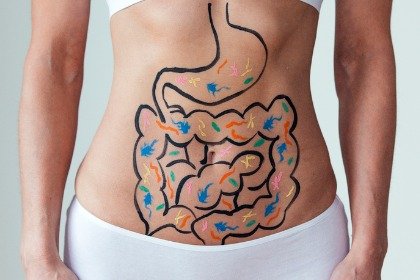
There are physiological reasons why stress and anxiety can have a disturbing effect on gut health and lead to bowel-related issues. For one thing, your brain and digestive tract are inextricably linked.
Think about the saying “gut feeling.” Everyone knows what that means – a strong emotion felt right in the gut. Or how about when someone says something hurtful to you and you immediately have a “gut reaction.” Oftentimes this can feel like you’ve been physically punched in the stomach.
This is because your brain and digestive tract communicate with each other non-stop. The digestive tract has a complex of nerves (100 million neurons; more than in the spinal cord!) and acts as an organ of the nervous system as much as the brain does.
As a result, brain health is very much interlinked with gut health, meaning that something upsetting can not only cause mental distress but can also immediately be felt with your bathroom habits. In other words, you can’t stop pooping or feel like you have to poop, but can’t.
How a Candida Infection Can Affect the Brain
Imbalances in gut bacteria, such as a rampant candida infection, can also affect the brain. In fact, researchers have found that those with a history of candida infections were more likely to suffer from mental illness [1].
Stress Impacts Neurotransmitters

We also know that neurotransmitters, chemical messengers that move between nerve cells and influence their action, can get out of balance due to many different factors. Stress is a major reason for this imbalance.
Recent research has found that people with anxiety do not have enough specific neurotransmitters like serotonin for mood control OR proper bowel function [2].
Stress Diarrhea: What Happens When You Can’t Stop Pooping?
When you’re stressed or anxious, muscles in the gut can contract and spasm. These spasms, depending on where they happen in the gut, have a lot to do with what comes out of your body or what doesn’t come out.
If the spasms occur all along the digestive tract, the whole colon is contracting. This can be painful and cause stomach aches and even low back pain, but it also causes whatever is in the gut to move through very quickly, resulting in stress diarrhea.
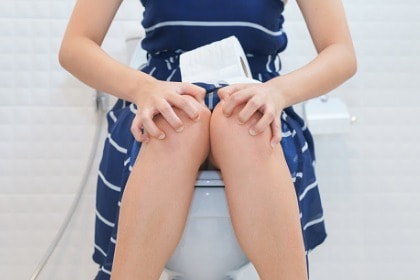
Indirectly, stress diarrhea can decrease nutrient absorption because nutrients are passing through so quickly. Also, oxygenation to gut tissues decreases, blood flow through the digestive tract decreases, and necessary enzymes required to break down the nutrients are also decreased. All of this can, over time, play havoc with your health.
Can Stress Cause Constipation?
Can stress make you constipated as well as cause diarrhea? Unfortunately, the answer is yes! When stress is the issue, often what is occurring is that stress-related spasming in the gut is occurring in just one area. This effectively blocks up the colon, resulting in stress constipation.
The slow movement of nutrients through the gut with too little water getting absorbed creates dry stools. Dry stools are much harder (even painful at times) to excrete. A person can feel “blocked up,” have flatulence (gas), and feel fairly ill when they are having fewer than three bowel movements per week.
Stress Diarrhea vs Stress Constipation: Which Happens to You?
Whichever you experience when stressed – diarrhea or constipation – usually depends on your particular gut and its issues. According to Dr. Brian Kirsh, a gastroenterologist at the Cleveland Clinic, diarrhea is much more common than constipation when a person is under stress.
However, it depends upon your gut health and what you normally deal with. Stress pushes your gut towards its usual default operation, whether that be diarrhea or constipation.
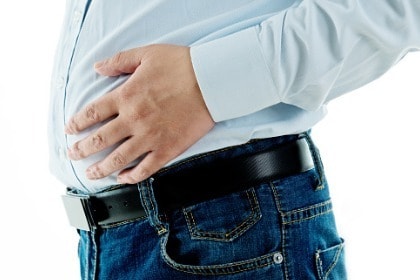
Stress can also make underlying conditions such as Irritable Bowel Syndrome (IBS) or Crohn’s disease even worse, as sufferers from this condition will all too readily tell you. If the digestive tract is already prone to inflammation, stress just adds fuel to that fire.
Having constipation or diarrhea when you’re stressed does NOT mean you have a chronic condition like IBS or Crohn’s disease. That being said, long periods of unmanaged stress can certainly lead to these conditions.
People with chronic gut conditions generally have a variety of symptoms that can occur whether or not they’re stressed. If you’re experiencing these conditions frequently, please consult a trusted healthcare practitioner.
7 Tips for Minimizing Stress Diarrhea and Stress Constipation
1. Learn to De-stress. Because bowel function is a completely automatic process, it’s sometimes hard to see how dealing with stress will help you. But the biggest improvement in bowel issues will come from learning techniques on how to minimize stress and anxiety in the first place.
Addressing stress head-on through the regular practice of stress reduction techniques like cognitive behavioral therapy, meditation, mindfulness, physical activity, and/or counseling is vitally important and should be your first step.

2. Eat Healthfully. In order to ensure you’re not upsetting your bowels further, make your diet the healthiest foods possible. Avoid acidic foods such as soda, and especially sugar, alcohol, and excessive caffeine. Pay attention to what foods make your condition worse and avoid them when you’re feeling stressed.
Herbal teas and essential oils including chamomile, ginger, peppermint, and fennel are calming to the gut. Important: be careful when ingesting (swallowing) essential oils as only certain ones are safe and they must be high-quality oils intended for ingestion. Seek guidance from a qualified healthcare practitioner or aromatherapist.
Eat plenty of prebiotic foods like barley, oats, apples, bananas, dandelion greens, leeks, and asparagus. Prebiotics help to feed your beneficial gut flora. Omega-3 fatty acids in oily fishes (e.g., salmon, sardines, and mackerel) help brain health and assist with mood stabilization.
If stress constipation is the problem, increase your intake of fiber and lots of filtered water. High-fiber foods include whole grains, beans, lentils, vegetables, and fruit. Including these foods, plus the practice of regular stress reduction mentioned in tip #1, will help you regain regularity.
3. Relax with Essential Oils. Essential oils can be used in many ways to help reduce stress and anxiety levels. One of the most popular for this is lavender essential oil which promotes a sense of calm, helping you to relax.

Peppermint is also extremely healing for the gut. Recent research on peppermint oil and IBS found that enteric-coated capsules that don’t release peppermint oil until they reach the intestines are especially effective and won’t cause heartburn (which can happen if you put peppermint oil in capsules). Researchers found that the menthol in peppermint has antispasmodic action and stimulates a pain-relieving pathway referred to as TRPM8 [3]. The combined effect helps to ease the pain and discomfort of IBS.
Essential oils can be incorporated into many stress-reduction activities to multiply their benefits. Discover more here about essential oils for meditation and prayer, essential oils and massage, and essential oil baths.
4. Probiotics for Improved Gut Health. Gut imbalance is when a person has more bad bacteria (e.g., Candida albicans and E. coli) than good bacteria in their gut overall. Regularly supplementing with probiotics is one of the best ways to keep the balance in favor of the good bacteria in the digestive system.
Beyond all the general health benefits of having a healthy gut, one 2016 animal study found that supplementing with L. plantarum (the bacteria in Organixx ProBiotixx+ probiotics formula) “significantly reduced anxiety-related behavior” and “provided protection against stress-induced dysbiosis [4].”

5. Move Your Body. Exercise is important because it aids the digestive process and at the same time helps to decrease stress and anxiety. Make an effort to move your body for at least 30 minutes per day, five times per week. Yoga is wonderful, but just walking or gardening can make a big difference too. Check out some of the best exercises for women over 50 that don’t overstress the body.
6. Deep Breathing. This simple practice is incredibly beneficial when you’re feeling stressed or anxious. Take a break from whatever you’re doing and practice some deep, slow breaths. In through your nose for a count of five, and out through your mouth for a count of seven. Do this for a good five minutes and it will lower your heart rate and calm you down.
7. Get Maximum Nutrition by Using Digestive Enzymes. Enzymes are necessary for the digestion of food in your body. Raw plant foods provide the enzymes needed for good digestion, but most people eat a lot of cooked foods which have few to no enzymes. This places a burden on the pancreas to create more digestive enzymes which leaves it less time for other important bodily functions.
Taking a high-quality digestive enzyme supplement helps your body to digest food faster and more easily. This will also allow your body to pull more nutrients from the food you consume. Most people experience less intestinal gas and discomfort in general when their food is being fully digested.
These are seven actions you can take immediately to ease your burden of stress and anxiety and calm down digestive disorders like stress diarrhea and stress constipation. If you continue to have bowel problems once you have implemented the tips outlined above, be sure to consult with a trusted healthcare provider.
Organixx Enzyme 17 contains a whopping FIVE kinds of powerful protease enzymes in combination with one of the most advanced enzyme blends on the planet. It’s scientifically designed to help your body break down and process nutrients for better absorption, digestion, and overall health.
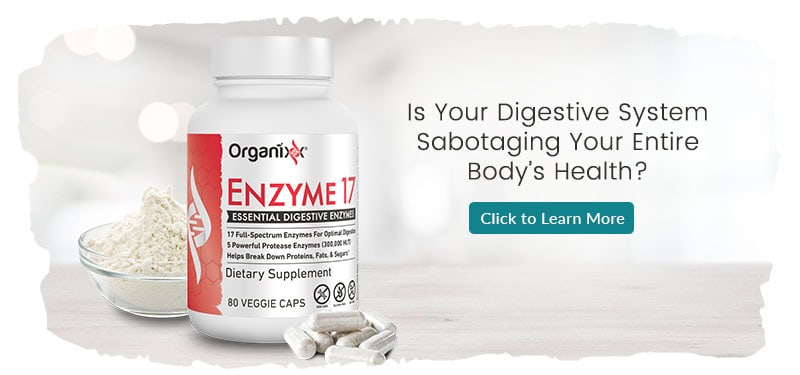
“The use of a 20 g daily collagen peptide supplement may reduce bloating and improve mild digestive symptoms in otherwise healthy female adults in the absence of any other dietary or lifestyle interventions.” —Effect of a Daily Collagen Peptide Supplement on Digestive Symptoms in Healthy Women
Research into how gut health affects all other aspects of our body’s health is one of the fastest-growing areas of medical research. The fact that bone broth can help the condition known as Leaky Gut is becoming part of medical wisdom for many forward-thinking doctors. For a long time, however, no one knew why it worked so well. Now research is confirming that collagen is the key. Collagen is an essential building block of all tissue creation – including within your digestive tract.
Why Does Collagen Work for Gut Health?
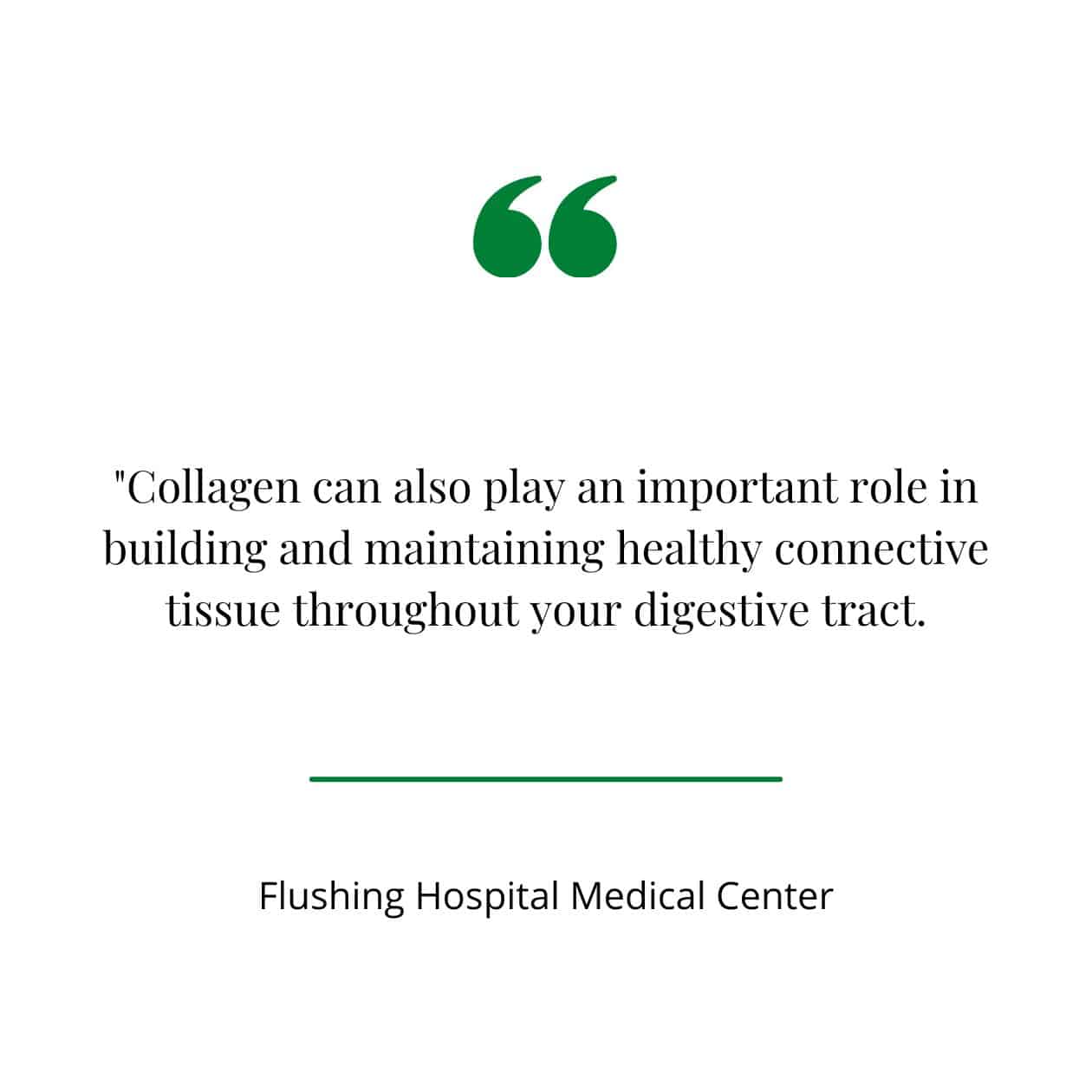
Image Source: Benefits of Collagen for Maintaining a Healthy Gut
Collagen is a kind of protein, which means that it is made up of amino acids, namely glycine and proline, as well as a few others [1]. There is also not just one kind of collagen. In fact, there are over two dozen types of collagen, although roughly 85% of the collagen in the body is made up of Type I, II, or III (or a combination of these three types).
Collagen is unique in the way that it “packs” itself into the body to create tissue. The abundant Type I Collagen is so strong in fact that some experts claim that it is “hard as steel.” Collagen forms strong yet pliable matrices within the body through something called “fibrils.” You can think of collagen as the “stuff that makes up stuff” that holds your body together. This means cartilage, muscle tissues and skin, and also bone, teeth, parts of the eyes, and organ tissue.
As stated before, Type I Collagen is the most prevalent type of collagen found in the body. It is also found in the digestive tract, along with Type III collagen. Foods and supplements that contain Type I and Type III collagen are excellent sources for improving gut health, as we shall see below.
The Evidence: How Collagen Helps Your Digestive Tract
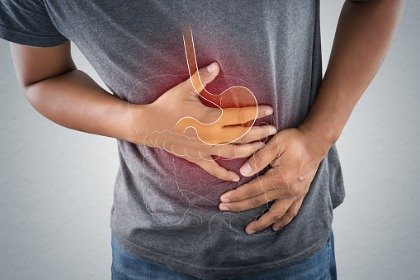 Besides simply improving gut health in general, research has indicated that collagen may provide relief for specific gut-related problems. Here are just a few of the studies and their key findings:
Besides simply improving gut health in general, research has indicated that collagen may provide relief for specific gut-related problems. Here are just a few of the studies and their key findings:
#1 – Collagen Helps Balance Stomach Acid.

Image Source: A Review of the Effects of Collagen Treatment in Clinical Studies
Did you know that we have an epidemic of low stomach acid, also called Hypochlorhydria, in the world today?
This is an issue that is talked about very little but can have vast consequences for your health. Stomach acid imbalance is linked to autoimmune disorders, hypothyroidism, the use of antacids and proton pump inhibitors, bad bacterial overgrowth (like H. Pylori), traditional cancer treatments including radiation therapy, gastric bypass surgery, vitamin and mineral deficiencies, stress… and the list goes on [2].
The issues above are relevant to just about everyone on the planet right now! Stomach acid helps your food to break down nutrients from the food you consume to be distributed where they need to go. You do the math: since most everyone has some kind of imbalance that can lead to low stomach acid, just about everyone has nutrient absorption issues as well.
Fortunately, specific lifestyle changes, as well as targeted supplementation, have been shown to help restore just the right amount of stomach acid to your system.
Collagen supplementation can play a key part in this. A study published in the American Journal of Physiology [3] found that the amino acid glycine found in large abundance in collagen helped to boost gastric juices. A German study conducted in 2017 generated similar findings [4].
#2 – Collagen Helps Hydrate the Digestive Tract.
The gut needs water to help move things along, which is one good reason why drinking water throughout the day is so important [5].
why drinking water throughout the day is so important [5].
Healthy collagen is considered a “hydrophilic” molecule, mainly because of its unique relationship with sugar molecules in a process called collagen glycation [6]. The collagen-sugar matrix is attracted to water as well as acidic substances.
When foods with collagen in them or collagen in supplement form are ingested, water begins to surround it, and this water (as well as stomach acid) can pass through the GI tract easier. This whole process helps with the breakdown of carbohydrates and other proteins and, thus, leads to better nutrient absorption and better health.
#3 – Collagen Helps to Repair the Stomach and Intestines.
Type I and III collagen are raw materials for almost all the connective tissue in the digestive system. Thus, the theory goes, by adding more collagen to the mix, you can repair the stomach and intestines and avoid complications like Leaky Gut (see below).
A 2004 study [7] conducted by the Medical Academy of Białystok in Poland found that one of the major characteristics in people with stomach cancer is defects in collagen metabolism. This makes sense since collagen also plays a vital part in gene expression, enzyme activity, and regulation of cellular growth.
#4 – Collagen Helps with Irritable Bowel Syndrome (IBS) and Stomach Ulcers.
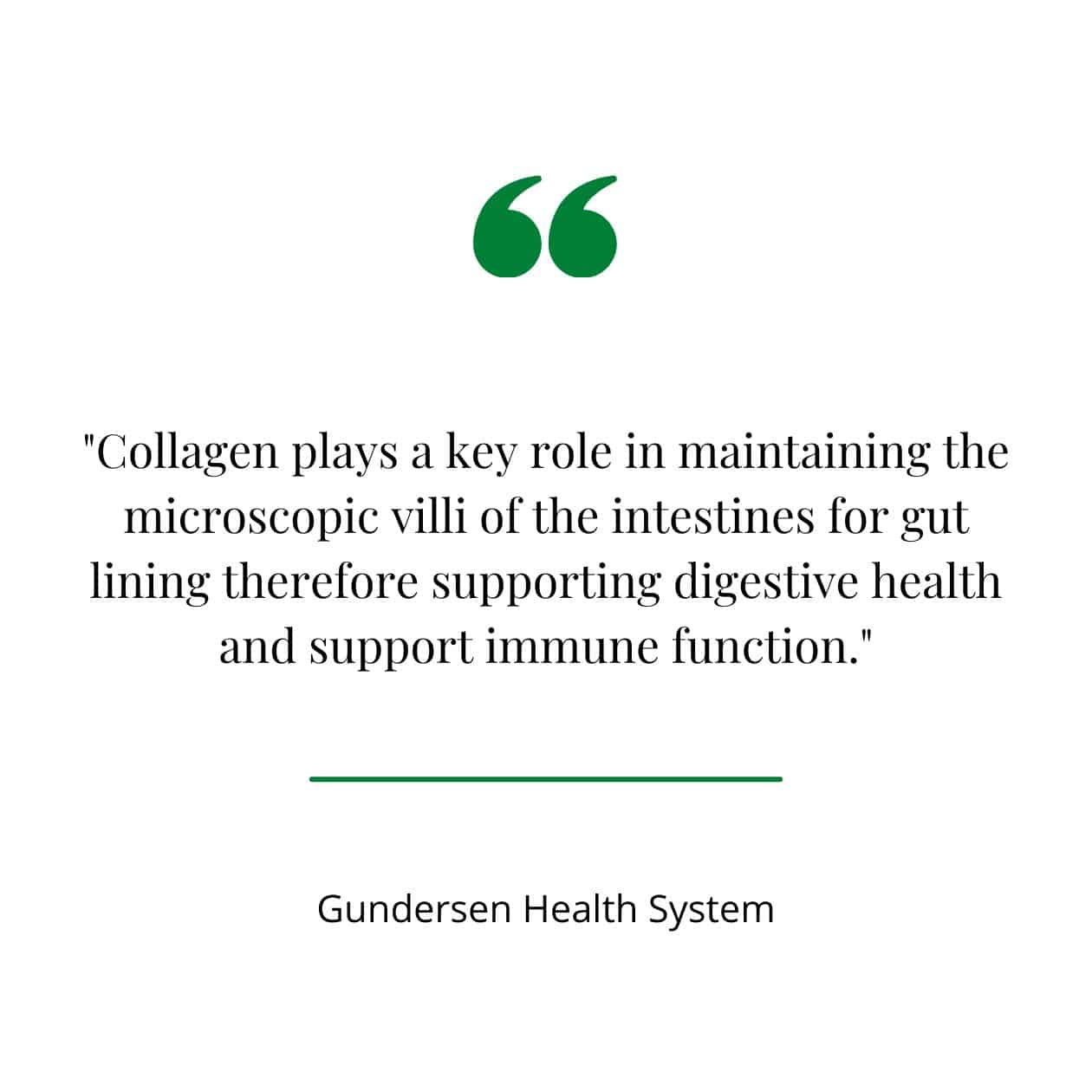
Image Source: What is the benefit of collagen in your diet?
With all the functions collagen helps within the digestive system and the body as a whole, it is no wonder that studies have indicated collagen supplementation can help with both Irritable Bowel Syndrome and stomach ulcers.
A 2003 study published in the Journal of Clinical Pathology found that individuals with IBS were more likely to have lower serum collagen levels than those who did not have IBS, especially collagen type IV [8]. In addition, a 2000 Nebraska Medical Center study found that the collagen in plain old chicken soup helped to reduce inflammation in the body as a whole, including in the gut. They traced this effect to its ability to turn off pro-inflammatory mechanisms within immune system cells [9].
Finally, a more recent Brazilian study published in the Journal of Medicinal Food found that a combination of whey protein and collagen supplementation helped to protect against ethanol-induced ulcerative lesions in the gut [10].
Ethanol [11] is produced as part of a fermentation process that may occur when food particles, especially sugars, stagnate in the gut and begin to “outgas.” These gases can be dangerous for brain health as well since they can pass through the blood-brain barrier and have a neurotoxic effect.

#5 – Collagen Helps with Leaky Gut.
Finally, there is the help that collagen may be able to provide for the millions of individuals who suffer from Leaky Gut.
Leaky Gut is also called intestinal permeability and occurs when tiny holes form in the digestive tract. This allows foreign matter to enter into the bloodstream where the immune system sees them as “invaders” and launches attacks, or autoimmune reactions, to them. The vicious cycle leads to chronic confusion for the immune system, and in many cases, to autoimmune diseases.
It is now known that roughly 80% of our immune system cells reside in the gut. The millions of tiny microscopic folds in the intestinal walls called “villi” are actually made of collagen. For this reason, collagen is thought to help “seal” the gut, allowing food particles to stay inside the intestines where they belong.
Much more research is definitely needed to find out how collagen can help with conditions like Leaky Gut and IBS as well as help digestive health as a whole. In the meantime, the growing body of research that is out there now paints a promising picture of the power of quality collagen supplements to provide relief to the millions of Americans who suffer from GI distress.



